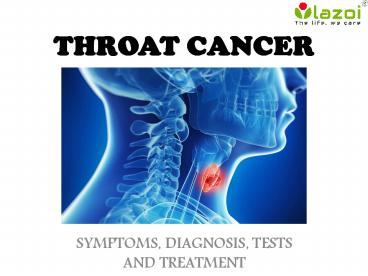Throat Cancer: Symptoms, Diagnosis, Tests and Treatment - PowerPoint PPT Presentation
Title:
Throat Cancer: Symptoms, Diagnosis, Tests and Treatment
Description:
Throat cancer affects the mouth, the oral cavity or the pharynx, the upper part of the throat. The oral cavity and the pharynx have many functions in the human body like breathing, talking among other thing. The throat cancer will attack the oral cavity or the pharynx. – PowerPoint PPT presentation
Number of Views:218
Title: Throat Cancer: Symptoms, Diagnosis, Tests and Treatment
1
THROAT CANCER
- SYMPTOMS, DIAGNOSIS, TESTS AND TREATMENT
2
INTRODUCTION TO THROAT CANCER
- The throat cancer affects the mouth, the oral
cavity or the pharynx, the upper part of the
throat. - The throat cancer will attack the oral cavity or
the pharynx. It can be found with the idea of the
common symptoms and can be treated. - The lump or nodule found in the mouth or neck is
the main symptom for the throat cancer. - Throat cancer can also affect the piece of
cartilage (epiglottis) that acts as a lid for
your windpipe. Tonsil cancer, another form of
throat cancer, affects the tonsils, which are
located on the back of the throat.
3
SYMPTOMS OF THROAT CANCER
- Signs and symptoms of throat cancer may include
- Cough
- Changes in your voice, such as hoarseness or not
speaking clearly - Difficulty swallowing
- Ear pain
- A lump or sore that doesn't heal
- A sore throat
- Weight loss
4
TYPES OF THROAT CANCER
- Though most throat cancers involve the same types
of cells, specific terms are used to
differentiate the part of the throat where cancer
originated. - Nasopharyngeal cancer begins in the nasopharynx -
the part of your throat just behind your nose. - Oropharyngeal cancer begins in the oropharynx -
the part of your throat right behind your mouth
that includes your tonsils.
5
TYPES OF THROAT CANCER
- Hypopharyngeal cancer (laryngopharyngeal cancer)
begins in the hypopharynx (laryngopharynx) - the
lower part of your throat, just above
your oesophagus and windpipe. - Glottic cancer begins in the vocal cords.
- Supraglottic cancer begins in the upper portion
of the larynx and includes cancer that affects
the epiglottis, which is a piece of cartilage
that blocks food from going into your windpipe. - Subglottic cancer begins in the lower portion of
your voice box, below your vocal cords.
6
TESTS AND DIAGNOSIS OF THROAT CANCER
- In order to diagnose throat cancer, your doctor
may recommend - Using a scope to get a closer look at your
throat Your doctor may use a special lighted
scope (endoscope) to get a close look at your
throat during a procedure called endoscopy. A
tiny camera at the end of the endoscope transmits
images to a video screen that your doctor watches
for signs of abnormalities in your throat.
7
TESTS AND DIAGNOSIS OF THROAT CANCER
- Removing a tissue sample for testing If
abnormalities are found during an endoscopy or
laryngoscopy, your doctor can pass surgical
instruments through the scope to collect a tissue
sample (biopsy). The sample is sent to
a laboratory for testing. - Imaging tests Imaging tests, including X-ray,
computerized tomography (CT), magnetic resonance
imaging (MRI) and positron emission tomography
(PET) may help your doctor determine the extent
of your cancer beyond the surface of your throat
or voice box.
8
TREATMENT OPTIONS FOR THROAT CANCER
- Radiation therapy Radiation therapy uses
high-energy beams from sources such as X-rays and
protons to deliver radiation to the cancer cells,
causing them to die. For early-stage throat
cancers, radiation therapy may be the only
treatment necessary. For more advanced throat
cancers, radiation therapy may be combined with
chemotherapy or surgery. - Surgery for early-stage throat cancer Throat
cancer that is confined to the surface of the
throat or the vocal cords may be treated
surgically using endoscopy. Your doctor may
insert a hollow endoscope into your throat or
voice box and then pass special surgical tools or
a laser through the scope. Using these tools,
your doctor can scrape off, cut out or, in the
case of the laser, vaporise very superficial
cancers.
9
TREATMENT OPTIONS FOR THROAT CANCER
- Surgery to remove all or part of the voice
box For smaller tumours, your doctor may remove
the part of your voice box that is affected by
cancer, leaving as much of the voice box as
possible. Your doctor may be able to preserve
your ability to speak and breathe normally. - Surgery to remove part of the throat Smaller
throat cancers may require removing only small
parts of your throat during surgery. Parts that
are removed may be reconstructed in order to
allow you to swallow food normally. - Surgery to remove cancerous lymph nodes If
throat cancer has spread deep within your neck,
your doctor may recommend surgery to remove some
or all of the lymph nodes to see if they contain
cancer cells.
10
TREATMENT OPTIONS FOR THROAT CANCER
- Chemotherapy Chemotherapy uses drugs to kill
cancer cells. Chemotherapy is often used along
with radiation therapy in treating throat
cancers. Certain chemotherapy drugs make cancer
cells more sensitive to radiation therapy. But
combining chemotherapy and radiation therapy
increases the side effects of both treatments. - Targeted Drugs Targeted drugs treat throat
cancer by taking advantage of specific defects in
cancer cells that fuel the cells'
growth. Cetuximab is one targeted therapy
approved for treating throat cancer in certain
situations. Cetuximab stops the action of a
protein that's found in many types of healthy
cells, but is more prevalent in certain types of
throat cancer cells.
11
CONNECT WITH US
- Logon to
- www.lazoi.com
- Like us on facebook
- https//www.facebook.com/LazoiTheLife
- Follow us on Twitter
- https//twitter.com/lazoithelife Follow us on
Pinterest - https//in.pinterest.com/lazoithelife/

